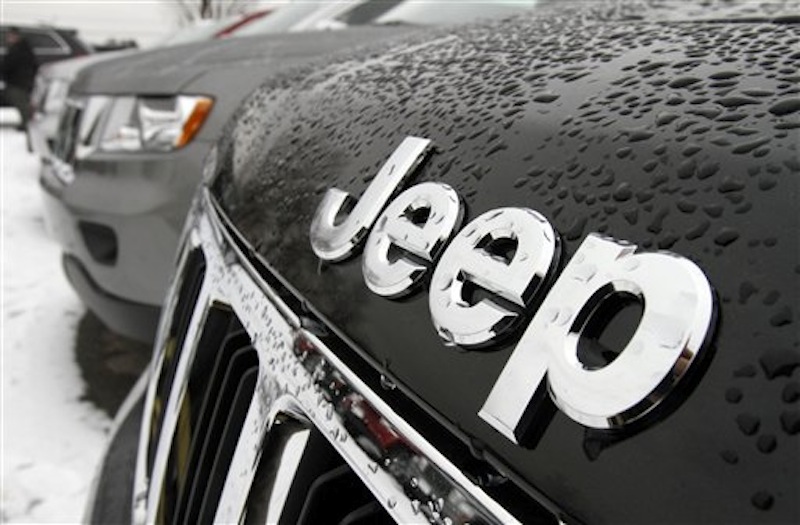DETROIT — Chrysler’s January U.S. sales jumped 44 percent over a year ago, starting off what is expected to be a strong year for auto sales.
The company said its Chrysler, Dodge, Jeep and Ram brands combined to give the company its best January tally in four years.
The increase is a sign that U.S. car sales started 2012 on a strong note, continuing their brisk pace from late last year.
Chrysler is the first automaker to report sales on Wednesday. Industry analysts expect a strong year in the wake of the recession because the average age of a vehicle has reached a record 10.8 years in the U.S. Buyers who needed to replace aging vehicles took advantage of low interest rates and greater loan availability in January.
Analysts expect that new car and truck sales hit a seasonally adjusted annual rate of 13.5 million vehicles last month. That follows an annual rate of 13.56 million in December and 13.63 million in November.
At Chrysler Group, total sales for the month rose to 101,149 from 70,118 a year ago. Chrysler brand led the way with an 81 percent increase, and the company attributed much of its gain to sales of sedans.
Chrysler Group LLC said it sold 7,007 Chrysler 200 midsize sedans last month, more than eight times the number it sold in January of 2010, a poor month for the company. In addition, the Chrysler 300 large sedan saw sales rise almost quadruple over a year earlier.
Hyundai and Kia are also expected to report big increases. General Motors, which had a strong January aided by great deals last year, will see sales drop, according to the TrueCar.com auto pricing website.
Not all trends are encouraging for industry sales. Consumer confidence fell in January after two straight months of big gains as Americans worried about incomes, gas prices and business conditions. Unemployment is at its lowest level in nearly three years, but it’s still 8.5 percent.
“Overall, the economy’s not in a good place yet, but I think consumers are reacting to the conditions much more favorably than expected,” said Jeff Schuster, senior vice president of forecasting for LMC Automotive, an industry consulting company in Troy, Michigan.
As credit loosens up, dealers are reporting more young buyers and more buyers with lower credit scores, Schuster said.
Wes Lutz, owner of a Chrysler-Dodge-Jeep-Ram dealership in Jackson, Mich., said January sales were good, but not nearly as strong as December. People in showrooms generally are more optimistic than they were early last year.
“The customers have more down payments. The credit market is loosening up some,” he said.
U.S. auto sales rose 10 percent to 12.8 million in 2011. That was up 23 percent from 2009, when the U.S. auto industry and the financial system were in peril.
In January, there were signs of good deals from Japanese automakers. They want to stop people from defecting to U.S. and Korean carmakers who are challenging their traditional area of strength, small- and midsize-cars.
Toyota and Honda lost sales last year when a March earthquake and tsunami forced them to slow their factories. Many dealers ran short of models to sell.
Toyota’s U.S. market share fell 2.3 percentage points last year to 12.9 percent, while Honda lost 1.6 percentage points and ended the year at 9 percent, according to Autodata Corp.
In January, Honda increased incentives such as rebates and low-interest financing by 12 percent from a year earlier, said Jesse Toprak, vice president of industry trends for TrueCar. The company spent $2,258 per vehicle on discounts, and much of the increase went to the midsize Accord, he said.
“It is the highest incentive spending we’ve seen Honda do for Accord ever,” Toprak said.
Honda wouldn’t say how much it’s spending on incentives, but spokesman Chris Martin said the company is trying to regain sales after last year, when it lost production of more than 200,000 cars and trucks due to the earthquake, and flooding in Thailand.
Toyota, however, reduced its incentive spending by 2.1 percent to $1,921 per vehicle.
Analysts last year predicted a price war as Honda and Toyota factories came back on line and the companies tried to regain market share lost to Hyundai and the Detroit automakers.
But Toprak says an all-out war isn’t likely because automakers are no longer producing more cars than people will buy. He expects skirmishes from time to time in certain segments. Automakers could start a price war in the compact car segment because of intense competition.
Copy the Story LinkSend questions/comments to the editors.



Success. Please wait for the page to reload. If the page does not reload within 5 seconds, please refresh the page.
Enter your email and password to access comments.
Hi, to comment on stories you must . This profile is in addition to your subscription and website login.
Already have a commenting profile? .
Invalid username/password.
Please check your email to confirm and complete your registration.
Only subscribers are eligible to post comments. Please subscribe or login first for digital access. Here’s why.
Use the form below to reset your password. When you've submitted your account email, we will send an email with a reset code.